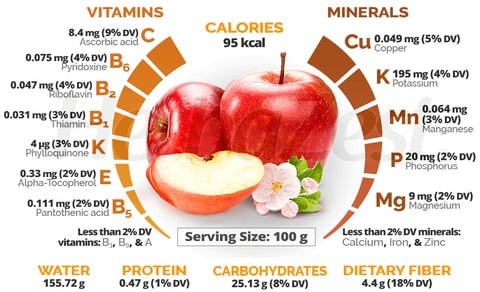Your trusted source for simple, practical nutrition advice and tips for a healthier lifestyle.
Apples are rich in fiber, vitamins, and antioxidants. They support heart health and aid in weight management.
Apples are one of the most popular fruits worldwide, and for good reason. They offer a variety of essential nutrients that contribute to overall well-being. High in dietary fiber, apples promote digestive health and help maintain a healthy weight. The vitamins, particularly vitamin C, boost the immune system and improve skin health.
Antioxidants found in apples, like quercetin and flavonoids, help reduce the risk of chronic diseases such as heart disease and diabetes. Whether eaten fresh, baked, or in juice form, apples provide a delicious and convenient way to enhance your diet. Enjoying an apple daily can be a simple yet effective step towards better health.

Credit: www.pinterest.com
Introduction To Apples
Apples are one of the most popular fruits worldwide. They are known for their sweet taste and crisp texture. Apples offer numerous nutritional benefits that make them a healthy choice for everyone.
Historical Background
Apples have a rich history that dates back thousands of years. They originated in Central Asia and were later brought to Europe. Ancient civilizations like the Greeks and Romans loved apples. They believed apples had magical properties. The fruit was also present in many myths and legends.
Global Popularity
Today, apples are grown in many parts of the world. They are especially popular in the United States, China, and Europe. Apples come in many varieties, including Fuji, Gala, and Granny Smith. Each type of apple has a unique flavor and texture.
Here is a table showing the top apple-producing countries:
| Country | Production (in tons) |
|---|---|
| China | 44 million |
| United States | 4.6 million |
| Poland | 3.6 million |
People enjoy apples in various forms. They can be eaten fresh, baked in pies, or made into sauces. Apples are a versatile fruit that fits into many diets. They are enjoyed by people of all ages.

Credit: www.britishapplesandpears.co.uk
Nutritional Profile
Apples are not just delicious; they are packed with essential nutrients. Understanding the nutritional profile of apples can help you appreciate their health benefits. In this section, we will explore the various vitamins, minerals, and macronutrients found in apples.
Vitamins And Minerals
Apples are rich in vitamins and minerals that are crucial for good health. Here are some key nutrients found in apples:
- Vitamin C: Boosts the immune system and promotes skin health.
- Potassium: Helps maintain healthy blood pressure and heart function.
- Vitamin K: Important for blood clotting and bone health.
- Vitamin A: Supports vision and immune function.
Macronutrients
Apples provide a balanced mix of macronutrients that fuel your body. Here’s a breakdown of these essential components:
| Macronutrient | Amount (per 100g) |
|---|---|
| Carbohydrates | 13.81g |
| Dietary Fiber | 2.4g |
| Protein | 0.26g |
| Fats | 0.17g |
Apples are a great source of carbohydrates, providing energy for your daily activities. The dietary fiber aids in digestion and keeps you feeling full. Though low in protein and fats, apples still contribute to a balanced diet.
Health Benefits
Apples are a delicious and nutritious fruit packed with many health benefits. They are rich in essential vitamins, minerals, and dietary fiber. Let’s explore how apples can contribute to a healthier lifestyle.
Heart Health
Eating apples can boost your heart health. They contain antioxidants like quercetin and flavonoids. These antioxidants help reduce bad cholesterol levels. This can lower the risk of heart disease.
Apples also have a good amount of soluble fiber. Soluble fiber helps lower blood pressure. A healthy blood pressure reduces the risk of stroke.
Weight Management
Apples are great for weight management. They are low in calories and high in fiber. This combination makes you feel full longer. A medium-sized apple has about 95 calories and 4 grams of fiber.
Eating apples can help reduce overall calorie intake. The high water content in apples also helps keep you hydrated. Staying hydrated is important for maintaining a healthy weight.
| Nutrient | Amount per Medium Apple |
|---|---|
| Calories | 95 |
| Dietary Fiber | 4 grams |
| Vitamin C | 14% of Daily Value |
Including apples in your diet can help you stay healthy and fit. They are a simple and tasty way to get many nutrients.
Antioxidant Properties
Apples are not just tasty; they are also packed with antioxidants. These antioxidants help protect our bodies from harmful substances. Let’s explore the types and benefits of these antioxidants found in apples.
Types Of Antioxidants
- Quercetin: A powerful antioxidant that helps boost the immune system.
- Vitamin C: Helps protect cells and keep them healthy.
- Chlorogenic Acid: Helps reduce blood sugar and aids in weight loss.
- Phloretin: Has anti-inflammatory properties and fights cancer cells.
Benefits Of Antioxidants
Antioxidants in apples provide many health benefits. Here are some key benefits:
- Boosts the Immune System: Helps the body fight off infections.
- Reduces Inflammation: Helps reduce swelling and pain in the body.
- Protects Heart Health: Reduces the risk of heart disease.
- Fights Cancer: Helps prevent the growth of cancer cells.
- Improves Skin Health: Keeps skin looking young and healthy.
Here’s a quick look at the antioxidants in apples:
| Antioxidant | Benefit |
|---|---|
| Quercetin | Boosts immune system |
| Vitamin C | Protects cells |
| Chlorogenic Acid | Reduces blood sugar |
| Phloretin | Fights cancer cells |
Digestive Health
Apples are great for digestive health. They have many nutrients that help your tummy. Eating apples can make your stomach feel better.
Fiber Content
Apples have a lot of fiber. One apple has about 4 grams of fiber. Fiber helps food move through your stomach. It helps prevent constipation. It also makes you feel full longer.
Gut Health
Apples contain pectin, a type of fiber. Pectin acts as a prebiotic. Prebiotics feed the good bacteria in your gut. This helps keep your gut healthy.
| Apple Part | Benefits |
|---|---|
| Skin | High in fiber |
| Flesh | Contains pectin |
- Apples help food move in your stomach.
- They prevent constipation.
- They make you feel full longer.
- They feed good bacteria in your gut.
Skin And Beauty
Apples are not only delicious but also amazing for your skin. They offer numerous benefits that help you achieve glowing, youthful skin. Let’s dive into how apples contribute to skin hydration and anti-aging effects.
Skin Hydration
Apples have a high water content, which helps keep your skin hydrated. Hydrated skin looks plump, fresh, and radiant. The natural sugars in apples also help retain moisture in your skin.
Here are some key benefits of apples for skin hydration:
- High water content keeps skin hydrated
- Natural sugars help retain moisture
- Vitamins and minerals nourish the skin
Eating apples daily can make your skin feel soft and smooth. You can also apply apple slices directly to your face for a quick hydration boost.
Anti-aging Effects
Apples are rich in antioxidants like Vitamin C and flavonoids. These antioxidants combat free radicals that cause premature aging. Regular consumption of apples can help reduce fine lines and wrinkles.
Here are some anti-aging benefits of apples:
| Antioxidants | Benefits |
|---|---|
| Vitamin C | Boosts collagen production |
| Flavonoids | Fights free radicals |
Apples also contain skin-friendly acids that promote cell regeneration. This helps in keeping your skin looking youthful and vibrant.
Include apples in your diet to enjoy these amazing skin and beauty benefits. Not only will you feel healthier, but you’ll also notice a glowing, younger-looking complexion.
Versatile Uses
Apples offer many uses beyond just eating them raw. Their versatility shines in both the kitchen and beauty routines. This makes them a favorite for various applications.
Culinary Uses
Apples add flavor and nutrition to many dishes. They are perfect for baking, cooking, and even grilling. Below are some popular culinary uses:
- Apple Pie: A classic dessert loved by many.
- Apple Sauce: A healthy and tasty side dish.
- Salads: Add fresh slices to salads for a sweet crunch.
- Juices and Smoothies: Blend apples for a refreshing drink.
Apples can also be dried for snacks. They maintain most of their nutrients even after drying.
Diy Beauty Recipes
Apples are rich in vitamins and antioxidants. These properties make them ideal for beauty treatments. Here are some DIY beauty recipes:
- Apple Face Mask: Mix grated apple with honey. Apply to your face for a glowing complexion.
- Apple Hair Rinse: Use apple cider vinegar as a natural hair rinse. This adds shine and removes residue.
- Exfoliating Scrub: Blend apple and oatmeal for a gentle skin scrub.
These simple recipes use natural ingredients. They are easy to make and offer great benefits for skin and hair.
Choosing The Right Apple
Choosing the right apple is crucial for enjoying their nutritional benefits. Different types offer unique tastes and nutrients. Understanding these differences helps in making healthier choices.
Varieties
Apples come in many varieties, each with its own flavor and texture. Some common types are:
- Gala: Sweet and crisp, great for snacking.
- Granny Smith: Tart and crunchy, perfect for baking.
- Fuji: Very sweet and juicy, ideal for fresh eating.
- Honeycrisp: Balanced sweetness and tartness, versatile for all uses.
- Red Delicious: Mildly sweet, best eaten fresh.
Each variety has different levels of vitamins and antioxidants. Choose based on your taste and nutritional needs.
Organic Vs. Conventional
Organic apples are grown without synthetic pesticides. Conventional apples may have pesticide residues. Organic apples can be more expensive but may offer cleaner eating.
| Type | Pros | Cons |
|---|---|---|
| Organic |
|
|
| Conventional |
|
|
Both types offer essential nutrients. Wash apples well to reduce pesticide exposure. Consider your budget and health priorities when choosing.

Credit: www.buffalomarket.com
Frequently Asked Questions
What Are The Main Vitamins In Apples?
Apples are rich in vitamins, especially vitamin C. They also contain vitamins A and B-complex. These vitamins support immune health and energy production.
How Do Apples Aid In Digestion?
Apples are high in dietary fiber, particularly pectin. This fiber promotes regular bowel movements and supports gut health. They can help prevent constipation.
Are Apples Good For Weight Loss?
Yes, apples are low in calories and high in fiber. They help you feel full longer, reducing overall calorie intake.
Can Apples Boost Your Immune System?
Yes, apples contain antioxidants and vitamin C. These nutrients help strengthen the immune system and fight off infections.
Conclusion
Eating apples provides numerous nutritional benefits. They are rich in vitamins, fiber, and antioxidants. Including apples in your diet can boost your health. Enjoy them as a snack or in various recipes. Embrace the goodness of apples for a healthier lifestyle.
Start incorporating this superfruit today for optimal wellness.





